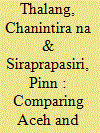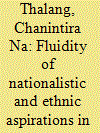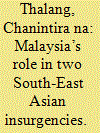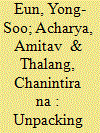|
|
|
Sort Order |
|
|
|
Items / Page
|
|
|
|
|
|
|
| Srl | Item |
| 1 |
ID:
153686


|
|
|
|
|
| Summary/Abstract |
Peace negotiations are shaped not only by the agents of conflict, but also by the structures in which they interact. From a comparative perspective, this article examines how both structural and agential factors have influenced the trajectory of the peace processes in Aceh and in Thailand’s southern border provinces.
|
|
|
|
|
|
|
|
|
|
|
|
|
|
|
|
| 2 |
ID:
086964


|
|
|
|
|
| Publication |
2009.
|
| Summary/Abstract |
Peace negotiations between the Indonesian government and the Free Aceh Movement (GAM) have resulted in the signing of the Memorandum of Understanding (MoU) ultimately ending a three-decade-long struggle for independence. Through a historical comparative analysis, this article explores the changing nature of Acehnese nationalism. It explores how Acehnese ethnicity and nationalism are constructed and how they have transformed over the decades in conflict with the Indonesian government. Acehnese ethnicity and nationalism, which are political in nature and ethnic in character, have ideologically shifted throughout time. Historical junctures and myths were utilised to legitimise these changing ideological goals. Despite the transformation of Acehnese nationalism and consequent changes in its ideological basis, a strong Acehnese identity still remains a constant.
|
|
|
|
|
|
|
|
|
|
|
|
|
|
|
|
| 3 |
ID:
163111


|
|
|
|
|
| Summary/Abstract |
While the general literature analysing mobility patterns in Thailand’s southern border provinces largely indicates insecurity and violence as precipitating factors for migration, such explanations fail to fully explain why the majority of those who migrate do so within the conflict area rather than away from it. Based on fieldwork, this article argues that while a lack of security measures and higher levels of violence in rural areas have induced people to migrate to more urban areas, a variety of factors, including emotional attachment to homeland, and cultural and religious considerations have influenced peoples’ decision to stay. Most importantly, the accumulation of ‘insider advantages’, enable most to adapt and seek employment despite the present circumstances.
|
|
|
|
|
|
|
|
|
|
|
|
|
|
|
|
| 4 |
ID:
186111


|
|
|
|
|
| Summary/Abstract |
In line with the themes presented in the introduction to this special issue, this article explores what impact twenty-first century global politics has had on Thailand’s agency. It is argued that while multi-dimensional challenges of the current world order have posed fewer constraints on Thailand’s capability to achieve intended outcomes, internal political instability and the U.S. ambivalence towards Southeast Asia on the whole complicates how Thailand navigates its position amidst the U.S.-China rivalry. However, these complications should not be construed as factors that restrict agency. Despite maintaining a close relationship with China, Bangkok has managed to find various ways to enhance its ability to achieve intended outcomes in order to protect the country’s autonomy. Based on Thailand’s experience, this article reveals the importance of using more open-ended approaches that pay equal attention to factors that complicate, enhance and constrain weaker state agency at both the domestic and international levels. It also offers opportunities for further research into non-material sources of state agency.
|
|
|
|
|
|
|
|
|
|
|
|
|
|
|
|
| 5 |
ID:
153267


|
|
|
|
|
| Summary/Abstract |
The conflicts in Thailand’s southern border provinces and Mindanao have not only posed a challenge to the Thai and Philippine governments, but have also affected the respective governments’ relations with Malaysia. From a comparative perspective, this article aims to illustrate how a complicated web of interactions between domestic and international factors has not only shaped domestic decision-making, but also influenced how states interact with one another in regard to the conflicts, which has resulted in a mix of cooperation and contention. It is argued that despite past downturns in bilateral relations, various developments have paved the way for Malaysia to play a role in the current peace processes in Thailand’s southern border provinces and Mindanao. However, Malaysia has been able to accomplish more in Mindanao’s peace process due to several favourable conditions, including the Philippine government’s openness towards third-party involvement, regional security concerns and politics that have been less polarised until 2016.
|
|
|
|
|
|
|
|
|
|
|
|
|
|
|
|
| 6 |
ID:
186109


|
|
|
|
|
| Summary/Abstract |
This introductory article provides rationales and contextual background for the special issue which examines how weak states in Asia actualise and exercise their agency in the twenty-first century regional or global environments. The article opens with a consideration of why attention is drawn to the agency of the weak. Weak states are often treated as ‘objects’ of international politics rather than ‘subjects’, and their foreign policy actions are commonly taken to be ‘reflexive’ of external constraints, such as fluctuations in the balance of power in the international system. We disagree with this view. We argue that weak actors can demonstrate varieties of agency regardless of their position in the international system in terms of material capabilities. To clarify this point, the article reflects on the changed and changing global and regional environments and order. Rather than seeing them through the lens of great power politics and its signature concept of ‘polarity’, the article offers an alternative notion, namely a ‘multiplex’ world, and identifies the key nature of order therein: multiplicity and fluidity. Both material and normative power have already and continue to become fragmented, decentralised, and dispersed within and across states. While emphasising that such a multifaceted and fluid world opens up a wide avenue of agency for weak actors, this article also notes that the weak has varieties of agency as potentials.
|
|
|
|
|
|
|
|
|
|
|
|
|
|
|
|
|
|
|
|
|